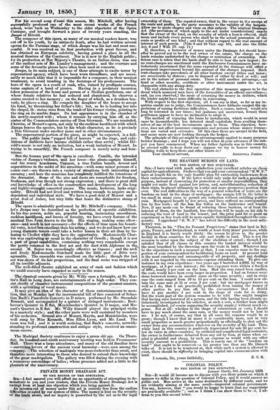PRIVATE MONEY DRAINAGE ACT.
TO THE EDITOR OP THE SPECTATOR.
Sin—I feel assured you will afford me an opportunity of attempting to de- monstrate to you and your readers, that the Private Money Drainage Act is exempt from at least one objection which you bring against it. An investment of money under this act is entirely free from the endless difficulties created by our system of titles. The money is lent on the security of the lands alone, and no inquiry is prescribed by the act as to the legal
ownership of them. The reputed owner, that is, the owner in tl.e receipt of the rents and profits, is the party necessary to the validity of the bargain. Allow me to quote chapter and verse on this subject. The original Drainage Act (the provisions of which apply to the act under consideration) enacts that the owner of the land, on the security of which a loan is effected, shall mean and include every person who shall be in the actual possession of the rents or profits of any kind ; and that without regard to the real amount of interest of such person. (Vale 9 and 10 Viet. cap. 101, and also the Tithe Act, 6 and 7 Will. IV. cap. 71.) If, therefore, a borrower of money under the Drainage Act should here- after be provei not to be the real owner of the estate, the charge on the lands remains undisturbed by the change or restitution of ownership. Suf- ficient care is taken that the lands shall be able to bear the new impost ; for no rent-charges are sanctioned until the Enclosures Commissioners har a sa- tisfactorily ascertained that the sums expended in the drainage will effect a permanent improvement beyond the.amount of the charges unpoecd. Such rent-charges take precedence of all other burdens except tithes and taxes ; are recoverable by distress; can be disposed of either by deed or will; and are in the nature of _personal estate. There is still another advantage,—no bond or other security, certificate or other instrument under the act, is chargeable with any stamp-duty.
The real obstacles to the free operation of this measure appear to be the dread which moneyed men have of the formalities of an official surveillance; and, (as you observed,) the mode of returning the money in driblets, which the lender might have some difficulty in reinvesting. With respect to the first objection, all I can say is that, so far as my in- gullies enable me to judge, the Commissioners have hitherto escaped the op- probrium of raising factitious difficulties. Such a course, indeed, would not long be tolerated in our times ; but (palmam qui meruerunt, kraut) these gentlemen appear to have no inclination to adopt it. The method of repaying the loans by instalments, which would in some cases be inconsiderable, has deterred small capitalists from availing them- selves of one of the best investments open to them. This objection, how- ever, does not affect insurance companies and persons whose money transae- lima are varied and extensive. Of this class there are several in the field, and many more are now looking through the hedges. The principle of this act might be advantageously applied to many purposes besides drainage; and I hope you will not relax in your advocacy of the sub-
hct you have commenced. When my father Agricola was in this country, e erected walls to keep Scots out : suppose we try to borrow money for building walls to keep Sects and other beasts in ?


























 Previous page
Previous page